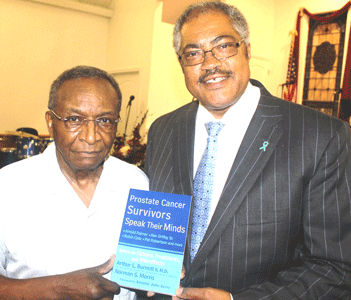As a youngster, Jim Thomas survived the perils of living in the urban housing projects of Detroit, Michigan. After high school, he was swiftly drafted into the Vietnam War. He survived that challenge too, later to retire as a celebrated U.S. Army Colonel.
Of equal importance, Thomas is also a 17-year prostate cancer survivor.
Recently, Thomas joined about 30 interested participants at a Community Health Service Forum targeting Prostate Cancer Health and Urology Research. Dr. Arthur L. Burnett II, a professor from the Department of Urology at Johns Hopkins University School of Medicine, where he is also director of the Basic Science Laboratory in Neuro-urology was the featured speaker.
Thomas, a patient of Dr. Burnett’s helped sponsor the event, which was held at the Come Just As You Are Bible Fellowship Crusade Ministry, in Severn, Maryland.
“I consider spreading this type of information as my ministry,” said Thomas, 78, who is a member of St. Mark United Methodist Church in Hanover.
As the oldest of nine children, Thomas notes that while African-American men experience high rates of prostate cancer, “all men, and wives and significant others should encourage their loved ones to make an appointment to get [checked].”
Comedian and actor Chris Tucker has become a national spokesman helping to spread the word to African-American men that they need to become more aware of their prostate health and the importance of early detection, diagnosis and treatment.
Thomas told the group that he, like many patients, never experienced any symptoms or warning signs before he was diagnosed.
“I only got checked because one of my brothers suggested that I get my PSA checked,” Thomas said.
Dr. Burnett concurred with Thomas, noting that the Prostate Specific Antigen (PSA) test is an essential tool used to diagnose prostate cancer. The PSA test measures levels of prostate–specific antigen in the blood. PSA is a protein produced by the cells of the prostate, and cancerous cells tend to produce more of it, so a spike in the PSA level can signify a problem, according to Santa Monica, California-based National Prostate Cancer Foundation.
“Pros-tate cancer, not Pros-TRATE cancer is highly prevalent in African-American men,” said Dr. Burnett, a District of Columbia native and general surgeon specializing in urology, prostate cancer and erectile dysfunction.
Dr. Burnett told the attendees at the meeting that typically, most men refrain from discussing the prostate because it’s a “taboo subject because it affects parts of our manhood and sexual relations,” but he said it’s vital that black men get checked early— around their mid-40s— because with early detection and treatment, many men can live long and productive lives after a prostate cancer diagnosis.
Dr. Burnette is the author of two books, “Johns Hopkins Patient’s Guide to Prostate Cancer” and “Prostate Cancer Survivors Speak Their Minds.”
For more information about Dr. Burnette and the Prostate Cancer speaking series, call Jim Thomas at 410-608-2081 or email: jimthomas2225@yahoo.com.
